Electric boilers for heating a private house: how to choose
When designing heating systems for private homes, special attention should be paid to the choice of heating devices. They must be reliable, durable, economical, low noise and easy to operate. All listed requirements are met by electric heating boilers for a private house, the following material is devoted to the specifics of the selection and installation of which.
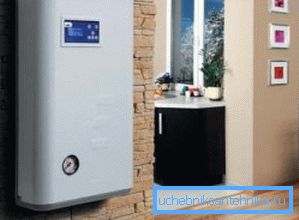
Device Description
The most common in our country are heaters running on the main or liquefied gas. However, in the absence of the possibility to install such systems, most owners of private houses acquire an electric boiler for heating a private house.
Note! Electricity is not the only alternative to gas. There are also solid fuel boilers and systems that use renewable energy sources: heat pumps, solar collectors for home heating and so on.

Heating a house with an electric boiler has many advantages:
- climate system with a heater powered by 220V, easy to install and operate;
- the process of heating the coolant is not accompanied by the formation of harmful products of combustion, because the electric boiler for home heating does not require the arrangement of a supply and exhaust pipe or chimney;
- subject to the rules of operation of the heater on electricity does not pose a danger to people living in the house and the environment;
- its operation does not require the presence of gas or solid fuel, that is, the system is almost autonomous;
- electric boilers for home heating can be installed in any room and do not require additional arrangement of a separate boiler room;
- Dual-circuit models of heaters, the price of which is only slightly higher, allow not only to heat houses up to 600 square meters. meters, but also to provide tenants with hot water.
Equipment types
Electric boilers for heating private houses come in several varieties:
- electrode;
- induction;
- with thermal electric heaters.
Consider each of these groups in more detail.
Electrode
These are the most common models. The heating of a private house by an electric boiler produced by electrode technology is most advantageous in terms of economy. The essence of his work is the effective use of the physical phenomenon of the electrical conductivity of liquids. So the greatest heating is reached at the least expenses of the electric power.
But there are limitations. In this case, the power of the electric boiler for heating the house is limited. Each module can only heat a certain amount of coolant to a low temperature. The cascade installation method helps to cope with this.
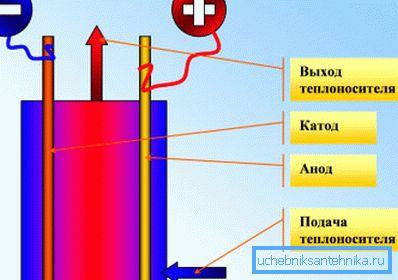
However, the following disadvantages prevent the widespread use of this type of device:
- if hard water is used as a heat carrier, it is necessary to change the electrodes or clean them from salt deposits every heating season;
- when using distilled water, freed from any impurities, significantly decreases the power of the heating system;
- To avoid electrical breakdown, equipment grounding procedures should be followed very carefully.
Induction
A striking example of such equipment is heating electric boilers for the house produced by the Russian company Galan. Their design is so simple that it allows you to do the installation yourself, without the involvement of outside specialists.
In addition, induction heater models have the following advantages:
- maximum efficiency - almost all the incoming energy is converted into heat, which is used for heating;
- boilers can be used to heat water entering the systems of liquid underfloor heating;
- This equipment is also suitable for providing hot water to people living in the house.
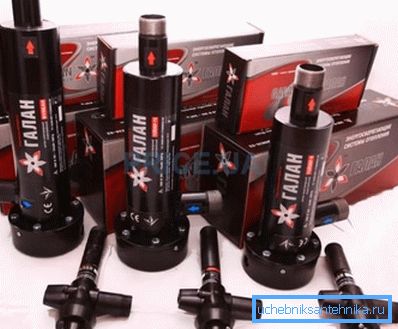
The disadvantages include the high cost and the need for complex and expensive repairs in the event of a breakdown.
On heating elements
A boiler that uses electric heaters to raise the temperature of the coolant can serve as a compromise and optimal in terms of price-quality ratio.
Modern electric boiler heating for the house has a special electronics, which independently regulates the various modes of operation of the equipment, without requiring constant attention from the person.
The disadvantages of the construction are obvious:
- not the highest efficiency - about 80%;
- a strong reduction in the power of heating elements in the formation of mineral deposits on them.
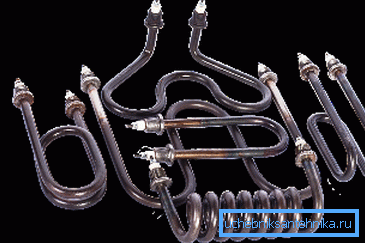
Combined
Power supply in the conditions of our country is not so rarely disconnected.
Therefore, the industry produces equipment using several types of fuel:
- electricity and firewood;
- electricity and solid fuel (pellets, briquettes, pellets, and so on).
This makes the system more flexible and protected from various kinds of trouble.
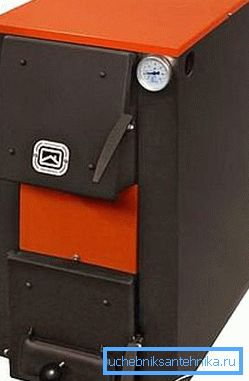
Installation of heaters
Power determination
The calculation of electric boilers for home heating does not differ from a similar procedure for heaters using other energy sources. The instructions provided in the current building regulations propose the use of the following formula:
W = Wud * S, where:
- Wood - specific power (this parameter differs depending on the place of construction of the house: in the north - 0.2, in the central regions - 0.07);
- S is the area of the house.
However, in order for the calculation to be most accurate, heat loss must be taken into account.
That is, the obtained value must be additionally multiplied by the following amendments:
- in the absence of insulation of the roof of the house - 0.25;
- in case of non-performance of wall insulation works - 0.35;
- in the presence of old windows - 0.15.
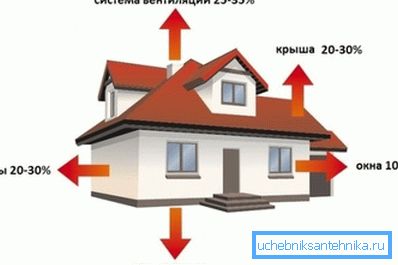
Primary requirements
Installation of equipment does not cause any difficulties, but it is necessary to adhere to the following requirements:
- The devices must be fast and easy to access.. On the sides and front, space should be provided for periodic maintenance or repair.
- The wall to which the boiler will be attached must be capitalized, since the walls of plasterboard and other similar materials will not withstand the load exerted..
- It is desirable that the correctness of the work you have done should be checked by a specialist who has the skills to arrange heating systems that are powered by electricity..
Note! Heating of a wooden house by an electric boiler is also permissible, however, in this case, you must additionally be convinced of the reliability of the electrical network, since a short circuit can cause a fire.
Remember that when using single-circuit heaters, it is necessary to provide for an additional installation of a flow or storage tank that will provide the people living in the cottage with the necessary amount of hot water.

Installation
The procedure itself is much simpler than installing a gas boiler or a solid fuel heater. There is no need to dock with the pipeline and installation of the pipe that takes the combustion products from the room. In addition, do not need a place to store coal, briquettes or firewood.
Work for the convenience of presentation will be divided into several stages:
- Your chosen boiler model is installed on a specially prepared flat surface or hung on the wall (depending on the design of the heater purchased).
- It must be ensured that the heater is installed without distortions, otherwise scum will quickly form in the heat exchanger, which will eventually lead to breakage.
- The boiler is connected to an electrical network that is reliably grounded. A three-core wire is used for the connection, the cross section of which depends on the power of the equipment.
- Then you need to connect the nozzles of the unit with the pipes of the heating system.
- The final phase of the installation is the launch of the equipment into operation and verification of its correct functioning in all possible modes.
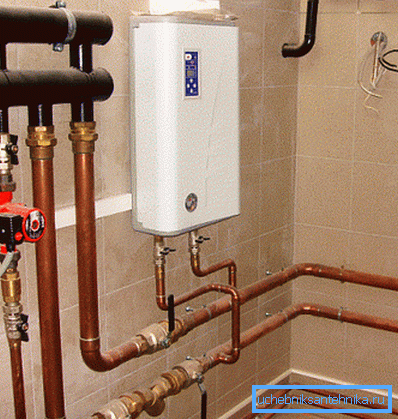
Conclusion
Before buying and installing an electric boiler, it is necessary to calculate the costs that you incur when paying bills for electricity in the heating period. It may be more appropriate to use alternative heat transfer fluids.
In any case, an electric heater can be used as a backup. You can learn more about this from the video below.